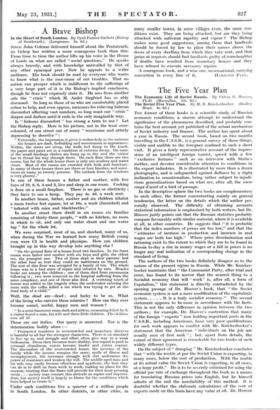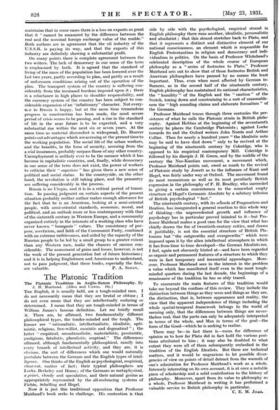The Five Year Plan
The Economic Life of Soviet Russia. By Calvin B. Hoover, Ph.D. (Macmillan. 12s. 6d.) THE former of these books is a scientific study of Russian economic conditions, a sincere attempt to understand the significance of the phenomena described, and probably con- tains the best account yet published of the actual mechanism of Soviet industry and finance. The author has spent about a year in Russia. The second book, based on two months travelling in the U.S.S.R., is a general survey of those things, visible and audible to the foreigner confined to such a short visit. It gives a fairly representative account of the impres- sions of an intelligent foreign tourist, spiced with a few
" exclusive features " such as an interview with Stalin's mother, and devotes considerable attention to conditions in the export industries. It is illustrated by more than a dozen photographs, and is safeguarded against dullness by a slight inclination to sensationalism, being rather subject to injudi- cious generalizations based on what are, after all, the mere coups d'oeuil of a bird of passage.
In the descriptive sphere the two books are complementary to each other, the former concentrating mainly on general tendencies, the latter on the details which the author per- sonally observed. The difficulty of obtaining accurate statistical information is emphasized by both writers, but Dr.
Hoover justly points out that the Russian statistics probably compare favourably with similar material, where it is available at all, in other countries. He suggests that "'it is probable that the index numbers of prices are too low," and that the " estimates of increase in production and increase in real wages are both too high." Where price discrimination and rationing exist to the extent to which they are to be found in Russia to-day a rise in money wages or a fall in prices is no longer any real indication of a corresponding change in the standard of living.
The authors of the two books definitely disagree as to the nature of the present regime in Russia. While Mr. Knicker- bocker maintains that " the Communist Party, after trial and error, has found to its sorrow that the nearest thing to a Socialist economy that will work' is, after all, a form of Capitalism," this statement is directly contradicted by the opening passage of Dr. Hoover's book, that " the Soviet economic system is not a mere modification of the capitalistic system It is a truly socialist economy." The second statement appears to be more in accordance with the facts. This is not the only difference in opinion between the two authors ; for example, Dr. Hoover's contention that many of the foreign " experts " now holding important posts in the U.S.S.R., including Americans, have very poor qualifications for such work appears to conflict with Mr. Knickerbocker's statement that the American " individuals on the job are usually men of first rank " ; but, apart from details, the extent of their agreement is remarkable for two books of such widely different types.
On the subject of " dumping " Mr. Knickerbocker concludes that " with the rouble at par the Soviet Union is exporting, in many cases, below the cost of production. With the rouble at its actual value the Soviet Union is exporting, in all cases, at a large profit." He is to be severely criticized for using the official par rate of exchange throughout the book as a means for translating Russian prices into English, but he himself admits at the end the unreliability of this method. It is doubtful whether the elaborate calculations of the cost of exports made on this basis have any value at all. Dr. Hoover
maintains that in some cases there is a loss on exports so great that it " cannot be measured by the difference between the real and the nominal foreign exchange value of the rouble." Both authors are in agreement that the oil industry of the U.S.S.R. is paying its way, and that the exports of this industry are definitely showing a substantial profit.
On many points there is complete agreement between the two writers. The lack of democracy in our sense of the term is emphasized by both. It is agreed that the standard of living of the mass of the population has been lowered over the last two years, partly according to plan, and partly as a result of unforeseen conditions arising out of the operation of the plan. The transport system of the country is suffering con- siderably from the increased burdens imposed upon it ; there is a reluctance in high places to shoulder responsibility, and the currency system of the country has been subject to con- siderable expansion of an "inflationary" character. Not every- one in Russia is happy, but at the same time tremendous progress in construction has been made, the most severe period of crisis seems to be passing, and a rise in the standard of life in the near future is to be expected, and a very substantial rise within the next six or seven years. At the same time as material discomfort is widespread, Dr. Hoover points out advantages which are accruing at the present time to the working population. The social life of the urban workers, and the benefits, in the form of security, accruing from the s icial insurances, probably surpass those of any other country. Unemployment is unlikely ever to be the menace which it has become in capitalistic countries, and, finally, while democracy in our sense of the term does not exist, the power of workers to criticize their " superiors " has given them a new sense of political and social status. In the countryside, on the other hand, the revolution is still taking place, and the peasantry are suffering considerably in the process.
Russia is no Utopia, and it is in a critical period of transi- tion. In passing judgment on certain aspects of the present situation probably neither author makes enough allowance for the fact that he is an American, looking at a semi-oriental people, with semi-oriental standards, economic, moral, and political, and an outlook more or less contemporary with that of the sixteenth century in Western Europe, and a community organized entirely in the interests of a working class who have never known " bourgeois " values. The consistency of pur- pose, asceticism, and faith of the Communist Party, combined with an extreme ruthlessness, and aided by the capacity of the Russian people to be led by a small group to a greater extent than any Western race, make the chances of success con- siderable. The assessment of gains and losses, however, is not the work of the present generation but of future historians ; and it is in helping Englishmen and Americans to understand, not to pass judgment, that these books, especially the first,







































 Previous page
Previous page